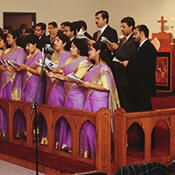 The biblical book of Psalms contains texts that serve as the basis for many Christian songs of praise. Musical traditions based on monastic chants often accompany these verses when they are sung during worship services.
The biblical book of Psalms contains texts that serve as the basis for many Christian songs of praise. Musical traditions based on monastic chants often accompany these verses when they are sung during worship services.
There is a hymn book built into the Bible: the book of Psalms. More than any other part of the Bible, the psalms have long been central to Christian prayer and worship. The first book to be published in America was the Bay Psalm Book, printed in Boston in 1640. The Anglicans in Virginia brought with them the tradition of plainsong, the chanting recitation of the psalms, and the Puritans of New England developed their own metrical psalmody. Today, choirs help continue the plainsong tradition in countless Episcopal churches in America and, for example, in the daily morning prayers at Harvard University.
The Book of Psalms contains 150 prayers and songs, attributed to King David but probably collected over many centuries. There are songs of praise and thanksgiving, singing from the heart to a God whose abundance and mercy have been experienced as life-giving blessings. There are also psalms of penitence and lament, psalms of abandonment and betrayal, and even psalms that express anger and righteous indignation. The range of the psalms is as wide as the range of human emotion, which perhaps accounts for the fact that these psalms have been cherished as a living prayer book for over 2,500 years. They are exuberant in their expressions of joy, and consoling in times of despair.
Both the Christian and Jewish traditions share a deep love of the psalms. While often read or recited, they were also meant to be sung, as is clear from the textual indications of breaks and melodic notations. In the Jewish tradition, they were sung as offerings to God, as petitions and thanksgivings, as hymns of pilgrimage to Jerusalem, and as festival songs. They were sung in the temple in Jerusalem, sometimes accompanied by stringed instruments. Today the psalms remain an integral part of Jewish prayer books and liturgies.
Naturally, the psalms were also the prayers and songs of the early church. For 2,000 years now, they have been used as prayers in corporate worship and private devotions, and they are recited antiphonally in many services of Christian worship. Beginning with the early forms of Gregorian chant in the 7th century (attributed to Pope Gregory I), the singing of psalms was incorporated into the daily and weekly rhythms of Christian monastic life. Even today, the six services of the monastic day are linked by the use of appropriate psalms, and the whole cycle of 150 psalms is sung every week. In Orthodox churches, the psalms pulse through the movements of the Divine Liturgy, as the Byzantine chant of the Greek Orthodox Church or the Slavonic chant of the Russian Orthodox Church.
In 17th century England, the Gregorian traditions developed into the distinctively Anglican plainsong or chant. These antiphonal psalms were sung by choirs and eventually incorporated into public worship. Like the Gregorian, this plainsong is sung without accompaniment. Its rhythm does not follow a fixed meter, but rather the cadence of the words of the psalms themselves. The psalms are framed with the Trinitarian doxology, “Glory be to the Father, and to the Son, and to the Holy Spirit.”
In the 1990s, recordings of the Gregorian chant and plainsong became popular, even among people who rarely attended church. The music itself seems to speak to the anxious rush of a busy world. The chanting of the psalms hovers between song and meditation. It follows the flow of the breath and the rhythm of poetry. “Its rhythmic tranquility becomes embedded in your soul,” as Benedictine David Steindl-Rast puts it. “The pure, serene, yet soaring sounds of the chant remind us that there is another way to live in this noisy, distracted world, and this way is not as out of reach as it might seem.”